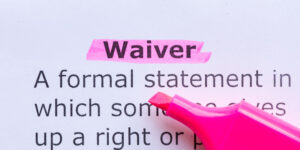A forfeiture of shares can occur when a shareholder fails to meet certain obligations and consequently loses (forfeits) entitlement to their shares and any rights attached to them. It typically arises due to the non-payment of shares.
In this post, we explain the most common reasons why forfeiture may arise and the process the company must follow when implementing this course of action. We also explain the implications for shareholders and how a forfeiture of shares can impact the company.
Why would a forfeiture of shares occur?
When a person holds shares in a company, they have certain obligations to fulfil in relation to their shareholdings. If they fail to comply with any terms under which their shares are issued, they may forfeit their rights and interests in those shares. This includes voting rights, dividend entitlements, and the right to attend general meetings.
The most common reason for forfeiture relates to the payment of shares. For example, a shareholder may forfeit their shares if:
- the company issues a call notice (payment demand) for an instalment or full payment on nil-paid shares, but the shareholder fails to pay by the call payment date (payment deadline)
- the company issues a call notice for the remaining unpaid amount on partly-paid shares, but the shareholder fails to pay by the call payment date
A forfeiture of shares may also arise under other circumstances, such as:
- a shareholder sells or transfers their shares during a restricted period (e.g. within a set amount of time after purchase)
- if a company issues fully paid shares on the condition that the recipient remains an employee or director for a minimum period, the person may forfeit those shares if they leave before the end of that specified period
- when the shareholder fails to provide necessary information or documentation to the company
- the shareholder violates any rules or regulations in the articles or the terms of a shareholders’ agreement
- using insider information for personal gain
- any other reasons specified in the articles or shareholders’ agreement
Upon forfeiture, ownership of the shares transfers from the shareholder to the company. At this point, the director must decide whether to sell, re-allot, or cancel those shares.
Forfeiture provisions in the articles of association
For a forfeiture of shares to occur, the company’s articles must contain forfeiture provisions. These should specify the scenarios that can lead to forfeiture and the required procedures the company must follow.
The model articles for private companies limited by shares do not provide for the forfeiture of shares. This is because private companies with model articles can only issue fully paid shares, meaning shareholders must pay for their shares when they take them.
However, the situation is different for public limited companies (PLCs). The model articles for PLCs include provisions and procedures relating to the forfeiture of nil-paid or partly-paid shares.
Where a private company wishes to issue shares with such payment terms and allow for forfeiture under specified circumstances, it must amend its articles accordingly to include the relevant provisions.
- How to change your company’s articles of association
- Do I need a shareholders’ agreement when I set up a company?
- Understanding nil-paid shares in a limited company
Neither the Companies Act 2006 nor common law make provision for the forfeiture of shares in private companies. Therefore, they may choose to replicate the relevant regulations relating to PLCs or use them as a basis for bespoke provisions with any necessary variations.
The statutory forfeiture regulations for PLCs can be found in The Companies (Model Articles) Regulations 2008 (Schedule 3, part 4, articles 52-62).
The forfeiture of shares process
In private companies, the rules and procedures relating to forfeiture must be set out in amended or bespoke articles of association. As such, the process will vary from company to company, depending on the circumstances under which forfeiture arises.
If the articles replicate the statutory forfeiture process for PLCs, the steps will be as follows:
- The directors will send a call notice to the shareholder requiring them to pay the company a specified sum for their nil-paid or partly-paid shares.
- If the shareholder fails to pay by the call payment date, the directors may issue a notice of intended forfeiture (a ‘forfeiture notice’) to the shareholder, giving them a set period to pay.
- Until the call is paid, the shareholder must pay the company interest at a specified fixed rate from the call payment date. Where no such rate is specified, it will be 5 per cent annually.
The notice of intended forfeiture must:
- be sent to the holder of the shares – or to a person entitled to those shares because of the shareholder’s death, bankruptcy, or otherwise
- require payment of the call (and any accrued interest) by a date at least 14 days after the date of the notice
- specify how the payment is to be made
- state that if the person fails to comply with the notice, the relevant shares will be liable to forfeiture
If the person does not comply with the notice of intended forfeiture by the specified deadline, the directors may decide that the relevant shares are forfeited. Typically, this will include all dividends and any other monies payable from those shareholdings that weren’t distributed before the forfeiture.
Requirements after forfeiture
The directors must notify the shareholder that forfeiture has occurred and record this in the statutory register of members. At that point, the person ceases to hold those shares. If the forfeiture affects all of their shareholdings, they cease to be a company member.
In some instances, it may also be necessary to update the register of people with significant control (PSC register). Furthermore, share certificates for the affected shares must be returned to the company for cancellation.
The shareholder remains liable to the company for the outstanding payments on those shares. This includes any interest, whether accrued before or after the date of forfeiture. The directors may decide to:
- waive any such payment requirements, either wholly or in part, or
- enforce payment without any allowance for share values at the time of forfeiture or for any consideration the company received on their disposal
However, if the company receives payment of all calls and any interest due regarding the forfeited shares before their disposal, the directors may decide to cancel the forfeiture. In such instances, the shareholder can retain their shares.
The effects of share forfeiture
Subject to the company’s articles, the shareholder loses all interests in their forfeited shares. This includes all claims and demands against the company relating to the shares. The forfeiture also extinguishes all other rights and liabilities incidental to those shares between the affected shareholder and the company.
At a date agreed by the directors and in accordance with the articles, the forfeited shares become the property of the company. The company can then deal with the shares in whichever manner it deems most appropriate at the time, such as:
- cancelling the shares
- selling or re-issuing the shares to existing or new shareholders
- holding on to the shares indefinitely while awaiting sale or re-allotment (private company)
- holding on to the forfeited shares for up to three years (public company)
A forfeiture of shares can have significant consequences for the affected shareholder and the company itself.
Effects on the shareholder
- They lose some or all of their stake in the company. This includes any voting or dividend rights attached to the forfeited shares.
- It results in diluting their ownership percentage or removal as a company member.
- Depending on how many shares the person loses, the dilution will reduce the impact of their voting power at general meetings.
- The shareholder will lose any sum they’ve already paid towards those shares.
- They will also lose any future dividend payments and potential gains on share value.
- It can hurt their reputation.
Effects on the company
- Additional administration and accounting for the company.
- It may impact the company’s value if the directors cannot sell the forfeited shares.
- Reissuing forfeited shares can negatively impact the company’s capitalisation structure and image. This could deter potential investors, who may have concerns about the company’s underlying risks.
- The company may have to sell the shares at a discounted price to attract buyers.
- The decision to forfeit shares could cause tension and give rise to disputes between the company and its members.
- Upon the sale of forfeited shares, the company may have to pay the former shareholder the sale proceeds, less any commission or fee.
While share forfeiture can cause issues for both shareholders and the company, it is a useful mechanism for encouraging accountability and compliance, dealing with problematic shareholders, and protecting the interests and rights of other members for
Thanks for reading
Many private companies, particularly those with multiple shareholders, can benefit from including forfeiture provisions in their articles of association. If you’re considering this for your company, we recommend seeking expert guidance from a solicitor.
Explore the 1st Formations Blog for limited company guidance and small business advice.
Please note that the information provided in this article is for general informational purposes only and does not constitute legal, tax, or professional advice. While our aim is that the content is accurate and up to date, it should not be relied upon as a substitute for tailored advice from qualified professionals. We strongly recommend that you seek independent legal and tax advice specific to your circumstances before acting on any information contained in this article. We accept no responsibility or liability for any loss or damage that may result from your reliance on the information provided in this article. Use of the information contained in this article is entirely at your own risk.












Join The Discussion
Comments (1)
We are so pleased you enjoyed our article!
It is our goal for our content to be applicable to all types of businesses.
Kind regards,
The 1st Formations Team